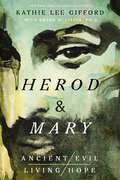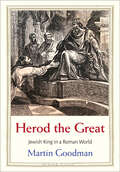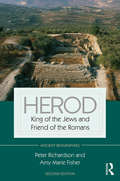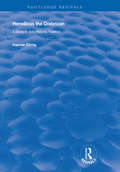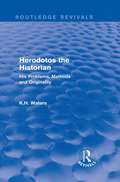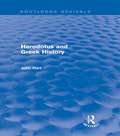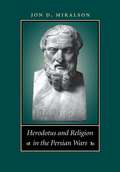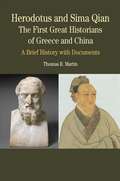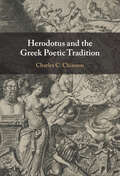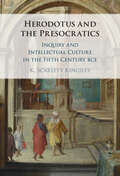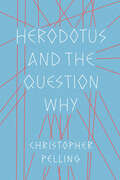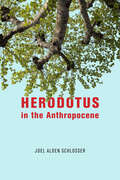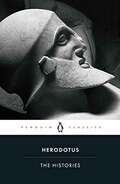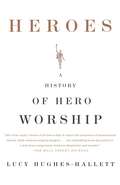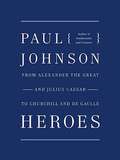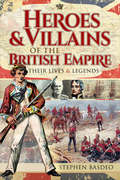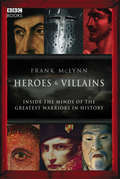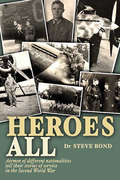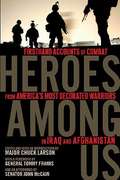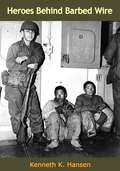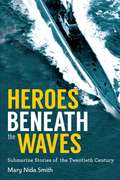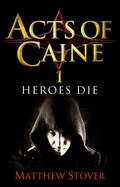- Table View
- List View
Herod and Mary: The True Story of the Tyrant King and the Mother of the Risen Savior (Ancient Evil, Living Hope #1)
by Kathie Lee GiffordExplore the interwoven lives of King Herod and Mary, Mother of Jesus as New York Times bestselling author Kathie Lee Gifford brings these biblical figures into a new light. Follow Herod from boyhood as he strives and fails throughout his life to become a beloved king. Walk in the steps of Mary of Nazareth as she navigates the repercussions of Herod's deadly obsession.Delve into the complex history of Herod the Great—his rise to power and ultimate fall in pursuit to be the "King of the Jews." Under a flourishing yet tumultuous background of Jerusalem, consider Mary of Nazareth's place under Herod's rule and the promise of a Messiah to free her people. Kathie Lee Gifford with Bryan M. Litfin, Ph.D. deftly weave a truthful historical narrative full of accurate details and sweeping prose that ushers in the true King and glorifies God's powerful plan to bring a savior into the world through unlikely means. A coda between the authors, full of honest revelation and insightful meaning, follows each chapter for added in-depth reading.The first installment in the Ancient Evil, Living Hope series, Herod and Mary begins with the tragic life of King Herod—Christianity's first true persecutor. As an impressionable boy, he is forever marked by the raw power of Rome. Throughout the course of Herod's career, he gains power, fame, and riches beyond belief. Yet murderous intrigues stalk this man—and infect his own dark soul.Under the rule of King Herod, Jerusalem becomes a prominent city of wealth and prosperity, but Mary saw the struggle of her people under a tyrant. Like all Jewish women, she knew the promises of Torah and longed for a deliverer. But no one could have prepared her for what the angel of God revealed: that the Messiah wouldn't arrive with the blaring of trumpets, the clash of arms, or the fanfare of a mighty host. He would arrive as an infant within her own womb. The light of the world was born in a cave: not a king who maims and destroys, but the gentle King of the Jews.This riveting narrative nonfiction work reveals deep insight to how Herod came to power, how corruption and an ancient evil threatened the stability of a nation, and how a teenage Mary was called to traverse these obstacles to bring the Savior, Jesus, our living hope, into the world.
Herod the Great: Jewish King in a Roman World (Jewish Lives)
by Martin GoodmanA vivid account of the political triumphs and domestic tragedies of the Jewish king Herod the Great during the turmoil of the Roman revolution &“Herod the Great is typical of Yale&’s Jewish Lives series: short, clear, deeply knowledgeable, deeply illuminating.&”—Dominic Green, Wall Street Journal Herod the Great (73–4 BCE) was a phenomenally energetic ruler who took advantage of the chaos of the Roman revolution to establish himself as a major figure in a changing Roman world and transform the landscape of Judaea. Both Jews and Christians developed myths about his cruelty and rashness: in Christian tradition he was cast as the tyrant who ordered the Massacre of the Innocents; in the Talmud, despite fond memories of his glorious Temple in Jerusalem, he was recalled as a persecutor of rabbis. The life of Herod is better documented than that of any other Jew from antiquity, and Martin Goodman examines the extensive literary and archaeological evidence to provide a vivid portrait of Herod in his sociopolitical context: his Idumaean origins, his installation by Rome as king of Judaea and cultivation of leading Romans, his massive architectural projects, and his presentation of himself as a Jew, most strikingly through the rebuilding of the Jerusalem Temple. Goodman argues that later stories depicting Herod as a monster derived from public interest in his execution of three of his sons after dramatic public trials foisted on him by a dynastic policy imposed by the Roman emperor.
Herod: King of the Jews and Friend of the Romans (Routledge Ancient Biographies)
by Peter Richardson Amy Marie FisherHerod: King of the Jews and Friend of the Romans examines the life, work, and influence of this controversial figure, who remains the most highly visible of the Roman client kings under Augustus. Herod’s rule shaped the world in which Christianity arose and his influence can still be seen today. In this expanded second edition, additions to the original text include discussion of the archaeological evidence of Herod’s activity, his building program, numismatic evidence, and consideration of the roles and activities of other client kings in relation to Herod. This volume includes new maps and numerous photographs, and these coupled with the new additions to the text make this a valuable tool for those interested in the wider Roman world of the late first century BCE at both under- and postgraduate levels. Herod remains the definitive study of the life and activities of the king known traditionally as Herod the Great.
Herodicus the Cratetean: A Study in Anti-Platonic Tradition (Routledge Revivals)
by Ingemar DuringOriginally published in 1941. Herodicus was a Greek physician of the fifth century BC, and a native of Selymbria. The first use of therapeutic exercise for the treatment of disease and maintenance of health is credited to him, and he is believed to have been one of the tutors of Hippocates.
Herodotos the Historian: His Problems, Methods and Originality (Routledge Revivals)
by K. H. WatersThe work of Herodotos of Halikarnassos, ‘the father of history’, differs in many ways from that of modern historians, and it poses special problems to the student. Herodotos’ history of the Persian Wars, written in the second half of the fifth century BC, was both the first attempt at a comprehensive history and the first lengthy prose narrative in the Western cultural tradition. There was an almost total lack of written historical evidence in Greece at the time, and the audiences who paid to hear Herodotos’ lectures also expected historical dramatizations, and enjoyed descriptive material and anecdotes that today would be relegated to notes. In Herodotus the Historian, first published in 1985, K.H. Waters offers a comprehensive introduction to Herodotus’ background, aims, and methods. In a lively, informative style, this work offers a level-headed approach to an historian who has excited some extreme reactions and incited controversy among modern readers.
Herodotus Histories
by Simon HornblowerOne of the most important works of history in Western literature, by the freshest and liveliest of all classical Greek prose authors, Herodotus's Histories is also a key text for the study of ancient Greece and the Persian Empire. Covering a central and widely studied period of Greek history, Book V not only describes the revolt of the east Greeks against their Persian masters, which led to the great Persian Wars of 490–479 BC, but also provides fascinating material about the mainland Greek states in the sixth century BC. This is an up-to-date edition of and commentary on the Greek text of the book, providing extensive help with the Greek, basic historical information and clear maps, as well as lucid and insightful historical and literary interpretation of the text. The volume is suitable for advanced undergraduates, graduate students, teachers and scholars.
Herodotus and Greek History (Routledge Revivals)
by John HartHerodotus has shaped our knowledge of life, religion, war and politics in ancient Greece immeasurably, as well as being one of the most entertaining of all Classical Greek authors: fascinating, perceptive, accessible and not at all pretentious. Herodotus and Greek History, first published in 1982, examines the themes and preoccupations which form the basis for Herodotus’ style of history. The Athenian nobility, important protagonists in the context of what we know of his sources; the human and divine forces, which Herodotus understood as influencing the course of history; and the concepts of character and motivation are all discussed. Herodotus’ treatment of religious belief and oracles, politics and war, and his portrayal of certain prominent individuals are specifically investigated. The final chapter situates Herodotus in his historical context. John Hart’s lucid, well-informed and lively discussion of Herodotus will be value to A-level candidates, school teachers, undergraduates, lecturers and curious non-classicists alike.
Herodotus and Religion in the Persian Wars
by Jon D. MikalsonThe two great Persian invasions of Greece, in 490 and 480-79 B.C., both repulsed by the Greeks, provide our best opportunity for understanding the interplay of religion and history in ancient Greece. Using the Histories of Herodotus as well as other historical and archaeological sources, Jon Mikalson shows how the Greeks practiced their religion at this pivotal moment in their history.In the period of the invasions and the years immediately after, the Greeks--internationally, state by state, and sometimes individually--turned to their deities, using religious practices to influence, understand, and commemorate events that were threatening their very existence. Greeks prayed and sacrificed; made and fulfilled vows to the gods; consulted oracles; interpreted omens and dreams; created cults, sanctuaries, and festivals; and offered dozens of dedications to their gods and heroes--all in relation to known historical events.By portraying the human situations and historical circumstances in which Greeks practiced their religion, Mikalson advances our knowledge of the role of religion in fifth-century Greece and reveals a religious dimension of the Persian Wars that has been previously overlooked.
Herodotus and Sima Qian: A Brief History With Documents (Bedford Cultural Editions Series)
by Thomas R. MartinIn this accessible volume, Thomas R. Martin compares the writings of Herodotus in ancient Greece with those of Sima Qian in ancient China to demonstrate the hallmarks of early history writing. <P><P>While these authors lived in different centuries and were not aware of each other’s works, Martin shows the similar struggles that each grappled with in preparing their historical accounts and how their efforts helped invent modern notions of history writing and the job of the historian. <P><P>The introduction’s cross-cultural analysis includes a biography of each author, illustrating the setting and times in which he worked, as well as a discussion of how each man introduced interpretation and moral judgment into his writing. <P><P>The accompanying documents include excerpts from Herodotus’ The Histories and Sima Qian’s Shiji, which illustrate their approach to history writing and their understanding of their own cultures. Also featured are maps and illustrations, a chronology, questions to consider, and a selected bibliography.
Herodotus and the Greek Poetic Tradition
by Charles C. ChiassonThis is the first comprehensive analysis in any language of Herodotus' interaction with the Greek poetic tradition, including epic, lyric, and tragic poetry. It is essential reading for scholars of ancient Greek storytelling (including myth) and those interested in the hybrid nature of narrative history, as both a true or truth-based account of past events and a necessarily creative account, which requires the author to present data in a meaningful and engrossing literary form. Close readings of specific passages demonstrate how Herodotus uses the linguistic, thematic, and narrative resources of the poets to channel and challenge their social authority, and to engage the emotions and intellect of a broad Hellenic audience steeped in the traditions of poetic performance. Herodotus adopts or adapts some poetic features while rejecting others (explicitly or implicitly) as a means of defining the nature of his own research and narrative.
Herodotus and the Presocratics: Inquiry and Intellectual Culture in the Fifth Century BCE
by K. Scarlett KingsleyHerodotus' Histories was composed well before the genre of Greek historiography emerged as a distinct narrative enterprise. This book explores it within its fifth-century context alongside the extant fragments of Presocratic treatises as well as philosophizing tragedy and comedy. It argues for the Histories' competitive engagement with contemporary intellectual culture and demonstrates its ambition as an experimental prose work, tracing its responses to key debates on relativism, human nature, and epistemology. In addition to expanding the intellectual milieu of which the Histories is a part and restoring its place in Presocratic thought, K. Scarlett Kingsley elucidates fourth-century philosophy's subsequent engagement with the work. In doing so, she contributes to a revision of the sharp separation between the ancient genres of philosophy and history. This title is part of the Flip it Open Programme and may also be available Open Access. Check our website Cambridge Core for details.
Herodotus and the Question Why
by Christopher PellingThis study of the ancient historian’s work is “excellent . . . [A] rigorous and engaging introduction not only to Herodotus, but to many other Greek authors” (Times Literary Supplement).In the fifth century BCE, Herodotus wrote the first known Western history to build on the tradition of Homeric storytelling, basing his text on empirical observations and arranging them systematically. Herodotus and the Question Why offers a comprehensive examination of the methods behind the Histories and the challenge of documenting human experiences, from the Persian Wars to cultural traditions.In lively, accessible prose, Christopher Pelling explores such elements as reconstructing the mentalities of storyteller and audience alike; distinctions between the human and the divine; and the evolving concepts of freedom, democracy, and individualism. Pelling traces the similarities between Herodotus’s approach to physical phenomena (Why does the Nile flood?) and to landmark events (Why did Xerxes invade Greece? And why did the Greeks win?), delivering a fascinating look at the explanatory process itself. The cultural forces that shaped Herodotus’s thinking left a lasting legacy for us, making Herodotus and the Question Why especially relevant as we try to record and narrate the stories of our time and to fully understand them.
Herodotus and the Question Why
by Christopher PellingThis study of the ancient historian’s work is “excellent . . . [A] rigorous and engaging introduction not only to Herodotus, but to many other Greek authors” (Times Literary Supplement).In the fifth century BCE, Herodotus wrote the first known Western history to build on the tradition of Homeric storytelling, basing his text on empirical observations and arranging them systematically. Herodotus and the Question Why offers a comprehensive examination of the methods behind the Histories and the challenge of documenting human experiences, from the Persian Wars to cultural traditions.In lively, accessible prose, Christopher Pelling explores such elements as reconstructing the mentalities of storyteller and audience alike; distinctions between the human and the divine; and the evolving concepts of freedom, democracy, and individualism. Pelling traces the similarities between Herodotus’s approach to physical phenomena (Why does the Nile flood?) and to landmark events (Why did Xerxes invade Greece? And why did the Greeks win?), delivering a fascinating look at the explanatory process itself. The cultural forces that shaped Herodotus’s thinking left a lasting legacy for us, making Herodotus and the Question Why especially relevant as we try to record and narrate the stories of our time and to fully understand them.
Herodotus in the Anthropocene
by Joel Alden SchlosserWe are living in the age of the Anthropocene, in which human activities are recognized for effecting potentially catastrophic environmental change. In this book, Joel Alden Schlosser argues that our current state of affairs calls for a creative political response, and he finds inspiration in an unexpected source: the ancient writings of the Greek historian Herodotus. Focusing on the Histories, written in the fifth century BCE, Schlosser identifies a cluster of concepts that allow us to better grasp the dynamic complexity of a world in flux. Schlosser shows that the Histories, which chronicle the interactions among the Greek city-states and their neighbors that culminated in the Persian Wars, illuminate a telling paradox: at those times when humans appear capable of exerting more influence than ever before, they must also assert collective agency to avoid their own downfall. Here, success depends on nomoi, or the culture, customs, and laws that organize human communities and make them adaptable through cooperation. Nomoi arise through sustained contact between humans and their surroundings and function best when practiced willingly and with the support of strong commitments to the equality of all participants. Thus, nomoi are the very substance of political agency and, ultimately, the key to freedom and ecological survival because they guide communities to work together to respond to challenges. An ingenious contribution to political theory, political philosophy, and ecology, Herodotus in the Anthropocene reminds us that the best perspective on the present can often be gained through the lens of the past.
Herodotus: The Histories
by Herodotus Aubery De SélincourtThe book itself contains the chief information that we have about its author. His culminating story of the great invasion of 480-479 B.C. comes from men with whom he had talked; he never claims to remember any incident in it personally; and in agreement with this, later Greeks dated his birth in 484. He often has occasion to refer to later events; and the four latest, all in the last four books, refer to the first years of the Peloponnesian War, 431-430 (VI, 91; VII, 133 and 233; IX, 73). Perhaps soon after that, then, Herodotus died.
Herodotus: The Histories
by Herodotus Aubrey De Sélincourt John M. MarincolaTranslated by Aubrey de Sélincourt with an introduction and Notes by John M. Marincola. <P><P> For more than seventy years, Penguin has been the leading publisher of classic literature in the English-speaking world. With more than 1,700 titles, Penguin Classics represents a global bookshelf of the best works throughout history and across genres and disciplines. Readers trust the series to provide authoritative texts enhanced by introductions and notes by distinguished scholars and contemporary authors, as well as up-to-date translations by award-winning translators.
Heroes
by Lucy Hughes-HallettBeginning beneath the walls of Troy and culminating in 1930s Europe, a magisterial exploration of the nature of heroism in Western civilization. In this riveting and insightful cultural history, Lucy Hughes-Hallett brings to life eight exceptional men from history and myth to explore our timeless need for heroes. As she re-creates these extraordinary lives, Hughes-Hallett illuminates the attractions and dangers of hero worship. This is a fascinating book about dictatorship and democracy, seduction and mass hysteria, politics and culture, and the tensions between being good and being great.
Heroes
by Paul JohnsonA galaxy of legendary figures from the annals of Western history In this enlightening and entertaining work, Paul Johnson, the bestselling author of Intellectuals and Creators, approaches the subject of heroism with stirring examples of men and women from every age, walk of life, and corner of the planet who have inspired and transformed not only their own cultures but the entire world as well. Heroes includes: Samson, Judith, and Deborah Henry V and Joan of Arc Elizabeth I and Walter Raleigh George Washington, the Duke of Wellington, and Lord Nelson Emily Dickinson Abraham Lincoln and Robert E. Lee Mae West and Marilyn Monroe Ronald Reagan, Margaret Thatcher, and Pope John Paul II
Heroes & Villains of the British Empire: Their Lives & Legends
by Stephen BasdeoAn analysis of the builders of the British Empire, how they were represented in popular culture of the day, and how that vision has changed over time.From the sixteenth until the twentieth century, British power and influence gradually expanded to cover one quarter of the world’s surface. The common saying was that “the sun never sets on the British Empire.” What began as a largely entrepreneurial enterprise in the early modern period, with privately run joint stock trading companies such as the East India Company driving British commercial expansion, by the nineteenth century had become, especially after 1857, a state-run endeavour, supported by a powerful military and navy. By the Victorian era, Britannia really did rule the waves.Heroes and Villains of the British Empire is the story of how British Empire builders such as Robert Clive, General Gordon, and Lord Roberts of Kandahar were represented and idealised in popular culture. The men who built the empire were often portrayed as possessing certain unique abilities which enabled them to serve their country in often inhospitable territories and spread what imperial ideologues saw as the benefits of the British Empire to supposedly uncivilised peoples in far flung corners of the world. These qualities and abilities were athleticism, a sense of fair play, devotion to God, and a fervent sense of duty and loyalty to the nation and the empire. Through the example of these heroes, people in Britain, and children in particular, were encouraged to sign up and serve the empire or, in the words of Henry Newbolt, “Play up! Play up! And Play the Game!”Yet this was not the whole story: while some writers were paid up imperial propagandists, other writers in England detested the very idea of the British Empire. And in the twentieth century, those who were once considered as heroic military men were condemned as racist rulers and exploitative empire builders.
Heroes & Villains: Inside the minds of the greatest warriors in history
by Frank McLynnIn the history of warfare, an elite group of men have attained almost legendary status through their courage, ambition and unrivalled military genius. But many of these same men possessed deep personal character flaws. In Heroes & Villains, acclaimed historian Frank McLynn focuses on six of the most powerful and magnetic leaders of all time: Spartacus, Attila the Hun, Richard the Lionheart, Cortés, Tokugawa Ieyasu and Napoleon. How did these mortal men rise to positions of seemingly invincible power? What were the motives, the personal strengths and often weaknesses that drove them to achieve what no one else dared? In six powerful portraits, McLynn brilliantly evokes the critical moments when each of these warriors proved themselves in battle, changing their own lives, the destiny of their people and, in some cases, the history of the world. We discover what drove Spartacus to take on the might of Rome against seemingly impossible odds, and how the young Napoleon rose to power in dramatic fashion at the Siege of Toulon. Heroes & Villains is more than a collection of individual biographies. By examining the complex psychologies of these extraordinary men, McLynn builds up a convincing profile of the ultimate warrior. Accompanying a major BBC television series, this brilliant book takes us into the minds of the greatest warriors in history.
Heroes All: Airmen of Different Nationalities Tell Their Stories of Service in the Second World War
by Steve BondThis WWII history shares the personal stories of frontline airmen from all sides of the conflict gathered through original interviews. Aviation historian Steve Bond has spent years interviewing veterans of World War II. He recorded the stories of former airmen and crewmembers who shared the same pieces of sky at the same time. The project brought together British and German, German and Russian, British and Italian, American and German—sometimes literally. In Heroes All, Bond presents the stories of these veterans—some of whom are household names—with annotations and overviews providing historical context. This is not a book about the rights and wrongs of war, nor the strategies of the military commanders. It is about the experiences and feelings of those on the front line. This volume includes stories and recollections from veterans of the Air Transport Auxiliary, British Army, Fleet Air Arm, Italian air force, Luftwaffe, Royal Air Force, Royal Canadian Air Force and Navy, Soviet air force, US Army, US Army Air Force, US Navy, and other groupings.
Heroes Among Us
by John S. Mccain Major Chuck Larson General Tommy FranksMore than one million Americans have served in Iraq and Afghanistan, but fewer than 500 from this group have earned a Silver Star, Navy Cross, Air Force Cross, Distinguished Service Cross, or the Medal of Honor. These Americans have demonstrated extraordinary courage under fire?in the worst of circumstances. They come from all branches of the military. They also come from all over the country and all walks of life, representing the entire spectrum of races and creeds. But what unites them are their deeds of consummate bravery, beyond the call of duty. Heroes Among Us tells these extraordinary true stories of valor, honor and sacrifice.
Heroes Behind Barbed Wire
by Kenneth K. HansenBehind barbed wire in Korea, 88,000 heroic Chinese and North Korean prisoners of war wrote an unforgettable account of their disillusionment with communism. This is the simple and moving story of their resolute decision to remain on freedom’s side of the Bamboo Curtain, rather than accept repatriation to their communist homelands, vividly recounted here by a first-hand observer, the former Chief of Psychological Warfare of the Far East Command.The story begins before the Korean armistice, in the prison compounds maintained by the United Nations Command on Koje Island. Here, humane and thoughtful treatment proved a more potent weapon than the communists’ brainwashing methods. The prisoners were carefully screened; only those who declared they would forcibly resist repatriation were admitted to the non-communist camps. Inside the camps, even though behind barbed wire, these men found a greater freedom of opportunity than they had been allowed in their communist homelands. They learned to read and write, studied agriculture and learned useful trades; and enjoy sports and recreation.Then, from Oct. to Dec. 1953, under the terms of the armistice, the anti-communist prisoners faced a crucial test of their determination. In a demilitarized zone near Panmunjom they were individually interviewed and subjected to “explanations” by communist officials regarding their final choice. There is deep tragedy and high comedy in the encounters at Panmunjom: tragedy in the threats made by the communists against the men and their families; comedy in the ingenious methods the prisoners devised to turn the tables on their interviewers during these grotesque propaganda sessions.The outcome? Only three percent of the total number of prisoners interviewed chose to return to a life under communist rule. Here was a disastrous loss of face for the communist world, and a sweeping victory for the cause of individual freedom…
Heroes Beneath the Waves: Submarine Stories of the Twentieth Century
by Mary SmithThe unbelievable stories of the heroic men who sailed under the sea. In Heroes Beneath the Waves, many brave men who rode submarines to great depths and across the oceans into unknown territory share their experiences, fears, and thoughts. They allow us to travel back in time through their memories. Trained for years to keep silent--for "loose lips sink ships”--many still believe what they know to be classified and refuse to disclose even the minutest of recollections. Others, however, want to leave a legacy of reminiscences for people to learn and live by--to know that freedom is not free. Some stories will never be told. Held within the secret confines of their souls, these deep sea veterans block them out for self-perseverance. Yet, there are others who will never escape their own minds; they relive their underwater experiences over and over with eyes open or shut. Heroes Beneath the Waves is about teenage boys who left farms, small towns, and inner cities to defend the United States and democracy worldwide. Signing up for United States Navy submarine duty was an adventure of a lifetime during the early 1940s. Dreams of torpedoing Japanese and German ships and subs consumed their thoughts. Those who returned home as young men were older and wiser. Heroes Beneath the Waves was written to honor these men--gallant heroes--who served and are serving today on submarines. Skyhorse Publishing, as well as our Arcade imprint, are proud to publish a broad range of books for readers interested in history--books about World War II, the Third Reich, Hitler and his henchmen, the JFK assassination, conspiracies, the American Civil War, the American Revolution, gladiators, Vikings, ancient Rome, medieval times, the old West, and much more. While not every title we publish becomes a New York Times bestseller or a national bestseller, we are committed to books on subjects that are sometimes overlooked and to authors whose work might not otherwise find a home.
Heroes Die: Book 1 of The Acts of Caine (Acts of Caine)
by Matthew StoverTwo worlds. One killer.Renowned throughout the land of Ankhana, the assassin Caine has killed his share of monarchs and commoners, villains and heroes. He is relentless, unstoppable, the best at what he does.At home in the real world, Caine is Hari Michaelson, a superstar whose adventures in Ankhana command an audience of billions. Yet he's shackled by a rigid caste society, bound to ignore the grim fact that he kills men on a far-off world for the entertainment of his own planet.But now Michaelson has crossed the line. His estranged wife has disappeared in the slums of Ankhana. To save her, he must confront the greatest challenge of his life: a lethal game of cat and mouse with the most treacherous rulers of two worlds.Welcome to the world of Caine: Assassin. Hero. Superstar . . .From a New York Times bestselling author comes the start of a gritty action fantasy series like no other - perfect for fans of Joe Abercrombie, Brent Weeks, Mark Lawrence and the Assassin's Creed novels.'A gritty, bloody, deeply touching work of genius' - Scott Lynch'Hands down one of the most bad-ass, brutal - and brilliant - fantasy series of the last double-decade. You know this if you're already reading it. If you're not already reading it, then good lord, it's time you found out - John Scalzi'If you like really really gritty, dark fantasy like George RR Martin, Richard Morgan (Takashi Kovaks books) or ESPECIALLY Joe Abercrombie, you should get this book' - Felicia Day
